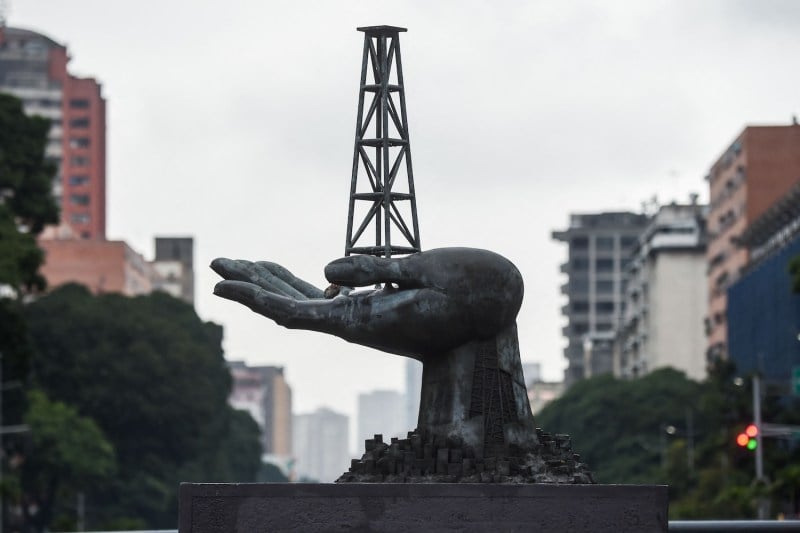Trump’s Gaza Proposal Prompts Global Shock, Condemnation

Trump’s Gaza Proposal Prompts Global Shock, Condemnation
The United States seizing control of the Palestinian territory would reverse decades of U.S. Middle East policy.
Activists participate in a rally against U.S. President Donald Trump’s Gaza proposal near the U.S. Embassy in Seoul on Feb. 5. Chung Sung-Jun/Getty Images
Welcome back to World Brief, where we’re looking at U.S. President Donald Trump’s proposal for Gaza, the impeachment of Philippine Vice President Sara Duterte, and a failed no-confidence vote in France.
‘The Riviera of the Middle East’
Foreign leaders vehemently denounced U.S. President Donald Trump’s unprecedented Gaza relocation proposal on Wednesday, warning that it would violate international law and destabilize the region, among other concerns.
Welcome back to World Brief, where we’re looking at U.S. President Donald Trump’s proposal for Gaza, the impeachment of Philippine Vice President Sara Duterte, and a failed no-confidence vote in France.
‘The Riviera of the Middle East’
Foreign leaders vehemently denounced U.S. President Donald Trump’s unprecedented Gaza relocation proposal on Wednesday, warning that it would violate international law and destabilize the region, among other concerns.
After meeting with Israeli Prime Minister Benjamin Netanyahu at the White House on Tuesday, Trump suggested that the United States seize control of Gaza, displace its entire population of 2.1 million people to other countries such as Egypt and Jordan, and then rebuild and develop the territory into “the Riviera of the Middle East.”
“We’ll own it and be responsible for dismantling all of the dangerous unexploded bombs and other weapons on the site, level the site and get rid of the destroyed buildings, level it out. Create an economic development that will supply unlimited numbers of jobs and housing for the people of the area,” Trump said at a joint press conference with the Israeli leader.
Asked by a reporter if Trump intends for the displaced Palestinians to return to Gaza once it has been rebuilt, the U.S. president said he envisioned it becoming an “international” place inhabited by “the world’s people,” including Palestinians.
“This is the kind of thinking that will reshape the Middle East and bring peace,” Netanyahu said at the press conference. He did not explicitly endorse Trump’s idea, though, saying only that it was “worth paying attention to” and that they were talking about it. The Israeli leader has repeatedly faced pressure from his far-right backers to expand Israeli settlements in the Palestinian territories and reject the cease-fire deal.
However, other foreign leaders swiftly rejected the proposal. It is “a recipe for creating chaos and tension in the region,” senior Hamas official Sami Abu Zuhri said. Saudi Arabia on Wednesday reiterated its stance that Riyadh will not establish ties with Israel without the creation of a Palestinian state and reaffirmed “its unequivocal rejection of any infringement on the legitimate rights of the Palestinian people,” including through attempts to displace them from their land. Trump has indicated that negotiating an Israel-Saudi Arabia normalization deal is a top foreign-policy priority for his administration.
Germany, Russia, and China all denounced Trump’s plan as well. Among the strongest objections came from Jordanian King Abdullah II and Egyptian President Abdel Fattah al-Sisi, with Abdullah saying he rejects any move to annex the territory and Sisi saying he would back Gaza’s reconstruction but not mass displacement. Abdullah is expected to visit Washington next week, and Sisi is scheduled to come the week after. Trump insists that he can convince both nations to accept Gaza’s residents by leveraging U.S. aid to their countries.
Even among Trump’s Republican allies, he faced some pushback. Sen. Lindsey Graham expressed concern, saying, “I think most South Carolinians are probably not excited about sending Americans to take over Gaza.” He added that the proposal may be “problematic” but that he is open to hearing what Arab leaders say.
Legal experts, rights activists, and some Democratic lawmakers took a harsher line, arguing that Trump’s Gaza proposal would violate international law, reverse longtime Western policy in the Middle East, and rupture the region’s fragile peace. “He’s completely lost it,” Democratic Sen. Chris Murphy said about Trump. “He wants a U.S. invasion of Gaza, which would cost thousands of American lives and set the Middle East on fire for 20 years? It’s sick.”
Today’s Most Read
- What IR Theory Predicts About Trump 2.0 by Stephen M. Walt
- What DeepSeek Revealed About the Future of U.S.-China Competition by Matt Sheehan and Scott Singer
- Abolishing USAID Is Both Unconstitutional and Disastrous by Matthew M. Kavanagh and Luis Gil Abinader
What We’re Following
Impeachment vote. The Philippine House of Representatives voted to impeach Vice President Sara Duterte on Wednesday, paving the way for a high-profile trial in the nation’s Senate. According to a 33-page complaint, Duterte stands accused of misusing public funds while in office; amassing unexplained wealth; violating the constitution; and threatening to assassinate President Ferdinand Marcos Jr., first lady Liza Araneta-Marcos, and House Speaker Martin Romualdez. Duterte denies these allegations but has not yet commented on her impeachment; her brother, Rep. Paolo Duterte, called it “a clear act of political persecution.”
The vote represents a major setback for the influential Duterte family, which has ruled Philippine politics for years; her father, Rodrigo Duterte, is best known for launching a war on drugs during his time as president that killed thousands of people. Sara Duterte is the second-most senior elected official to be impeached in Manila’s history, following a vote against then-President Joseph Estrada in 2000.
The Senate trial will likely occur when Congress reconvenes in June. If the upper house votes to impeach her, Duterte could be removed from office and receive a lifetime ban from politics. Such a ruling would hurt the Duterte family’s ambitions ahead of midterm elections in May and could help Marcos prepare a successor who is not reliant on the Dutertes for power.
A future budget bill. French Prime Minister François Bayrou’s government survived its first of several expected no-confidence votes in the National Assembly on Wednesday. The motion’s failure paved the way for Bayrou to pass a 2025 budget bill aimed at curbing the country’s high deficit. The bill goes to the Senate for final approval on Thursday.
Months of political turmoil have plagued French politics, as the left-wing New Popular Front and far-right National Rally party have formed an uneasy alliance to counter President Emmanuel Macron’s controversial economic proposals. Bayrou was Paris’s fourth prime minister in 2024. To remain in power, he agreed to a series of concessions, including abandoning plans to fire teachers and lower health care reimbursements, increasing pensions to address inflation, and introducing smaller spending cuts and tax increases.
Exodus at WHO. Argentina announced on Wednesday that it plans to leave the World Health Organization (WHO), becoming the second country to do so this year. President Javier Milei is expected to issue an executive order on Argentina’s withdrawal in the coming days.
“We Argentinians will not allow an international organization to intervene in our sovereignty, much less in our health,” presidential spokesperson Manuel Adorni said. A government statement accused WHO of damaging the Argentine economy during the COVID-19 pandemic by requiring quarantines.
Milei’s decision to withdraw from the international health body mirrors that of his ideological ally Trump, who similarly cited the organization’s alleged COVID-19 mismanagement as the reason for Washington’s announcement of its intent to withdraw on Jan. 20. WHO chief Tedros Adhanom Ghebreyesus has reportedly urged foreign leaders during closed-door sessions to pressure Washington to rejoin the health body.
Sweden’s worst mass shooting. Gunfire erupted at an adult education center in the Swedish city of Orebro on Tuesday, killing at least 11 people, including the suspected shooter. This is a “dark day” in the country’s history, Swedish Prime Minister Ulf Kristersson said, calling the attack Sweden’s worst mass shooting in the country’s history.
Authorities on Wednesday were still searching for a motive and confirmation of who was involved. An initial statement said that “everything indicates that the perpetrator acted alone without an ideological motive,” but chief of local police Roberto Eid Forest has urged anyone who might know more to come forward.
Stockholm has strict gun control laws. However, Sweden has among the highest gun violence rate per capita in the European Union, according to the Swedish National Council for Crime Prevention. The suspected gunman of Tuesday’s attack reportedly had a hunting license and used a hunting weapon to target the education center.
Odds and Ends
FP’s World Brief writer is not planning to move to Scotland anytime soon, but if she were, her cat Pepper would be allowed to move with her. Scottish First Minister John Swinney appeased public concern on Monday over false rumors that the Scottish government was considering a ban on cat ownership to protect endangered bird species in the United Kingdom. Such fears first spread when the Scottish Animal Welfare Commission issued a report advising Edinburgh to consider a range of measures to protect local wildlife from cats, including keeping pets indoors or on leashes. “The government’s not going to be banning cats or restricting cats,” Swinney said. World Brief will be on the prowl for further developments.
Alexandra Sharp is the World Brief writer at Foreign Policy. X: @AlexandraSSharp
More from Foreign Policy
-

Russian President Vladimir Putin looks on during a press conference after meeting with French President in Moscow, on February 7, 2022. The Domino Theory Is Coming for Putin
A series of setbacks for Russia is only gaining momentum.
-

The container ship Gunde Maersk sits docked at the Port of Oakland on June 24, 2024 in Oakland, California. How Denmark Can Hit Back Against Trump on Greenland
The White House is threatening a close ally with a trade war or worse—but Copenhagen has leverage that could inflict instant pain on the U.S. economy.
-

Donald Trump speaks during an event commemorating the 400th Anniversary of the First Representative Legislative Assembly in Jamestown, Virginia on July 30, 2019. This Could Be ‘Peak Trump’
His return to power has been impressive—but the hard work is about to begin.
-

US Secretary of State Marco Rubio greets employees at the State Department in Washington, DC, on January 21, 2025. The National Security Establishment Needs Working-Class Americans
President Trump has an opportunity to unleash underutilized talent in tackling dangers at home and abroad.







Join the Conversation
Commenting on this and other recent articles is just one benefit of a Foreign Policy subscription.
Already a subscriber?
.
Subscribe
Subscribe
View Comments
Join the Conversation
Join the conversation on this and other recent Foreign Policy articles when you subscribe now.
Subscribe
Subscribe
Not your account?
View Comments
Join the Conversation
Please follow our comment guidelines, stay on topic, and be civil, courteous, and respectful of others’ beliefs.
Change your username |
Log out
Change your username:
CANCEL
Confirm your username to get started.
The default username below has been generated using the first name and last initial on your FP subscriber account. Usernames may be updated at any time and must not contain inappropriate or offensive language.